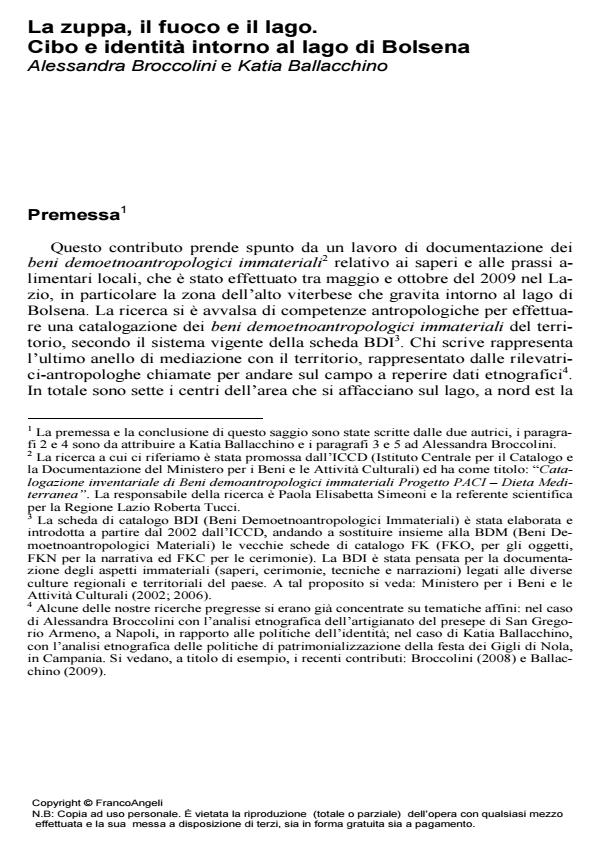La zuppa, il fuoco e il lago. Cibo e identità intorno al lago di Bolsena
Journal title CULTURE DELLA SOSTENIBILITA '
Author/s Alessandra Broccolini, Katia Ballacchino
Publishing Year 2010 Issue 2009/6
Language Italian Pages 32 P. 102-133 File size 3272 KB
DOI 10.3280/CDS2009-006007
DOI is like a bar code for intellectual property: to have more infomation
click here
Below, you can see the article first page
If you want to buy this article in PDF format, you can do it, following the instructions to buy download credits

FrancoAngeli is member of Publishers International Linking Association, Inc (PILA), a not-for-profit association which run the CrossRef service enabling links to and from online scholarly content.
This article draws on a research and documentation project on immaterial demo-ethno-anthropological resources sponsored by the Central Institute for Cataloging and Documentation (Istituto Centrale per il Catalogo e la Documentazione [ICCD]), a part of the governmental Department for Cultural Resources and Activities. This project investigated food-related practices and forms of knowledge in the Bolsena Lake area in the Province of Viterbo. In this article we focus primarily on the role a traditional lake area dish called sbroscia (a freshwater fish soup) plays in defining local identity within contemporary practices and forms of knowledge. Because of its intense flavor, not well suited to the palates of tourists, this soup has not been transformed into a commercial product. In many ways this dish therefore represents a narrative element and catalyst for senses of belonging to the lake area, thanks to its mythical and archaic origins, its powerful and intimate connection with the natural environment of the lake area and the local culture of traditional fishing which is strongly associated with mascu- linity. This anthropological investigation seeks to analyze the problematics involved in the processes of transforming local immaterial culture into heritage through the government’s practices of cataloging (using the BDI form). What these cataloging practices have trouble capturing is the complexity of the relationship between food and identity in the area of the lake, which is often referred to as the lake !that you drink" because of the use that had been and continues to be made of the lake water in the local recipe for sbroscia. In fact, it is precisely the use of the lake water, together with an exclusively male use of "non-domestic" fire and pignatto to cook the sbroscia that makes the preparation and consumption of this dish a significant symbolic ritual for the fishermen living in the area. The very habit of eating sbroscia with the hands is also part of local identity in the narrative memory of fishermen as they hark back to a pre-modern past. The contemporary daily use of sbroscia reveals the unclear relationship it has with other sites of food consumption (such as villages far from the lake, local feasts and restaurants) and reinforces its powerfully intimate, non-commercial, private, selective and "backstage" character. In what ways is it possible, therefore, to incorporate this ephemeral and complex resource, which walks the line between material and immaterial, into the process of promoting local areas and communities in a sustainable manner? This article seeks to address this and other questions related to ethnographic heritage.
Keywords: Intangible heritage, male identity, cataloging, sustainable development, food.
Alessandra Broccolini, Katia Ballacchino, La zuppa, il fuoco e il lago. Cibo e identità intorno al lago di Bolsena in "CULTURE DELLA SOSTENIBILITA '" 6/2009, pp 102-133, DOI: 10.3280/CDS2009-006007